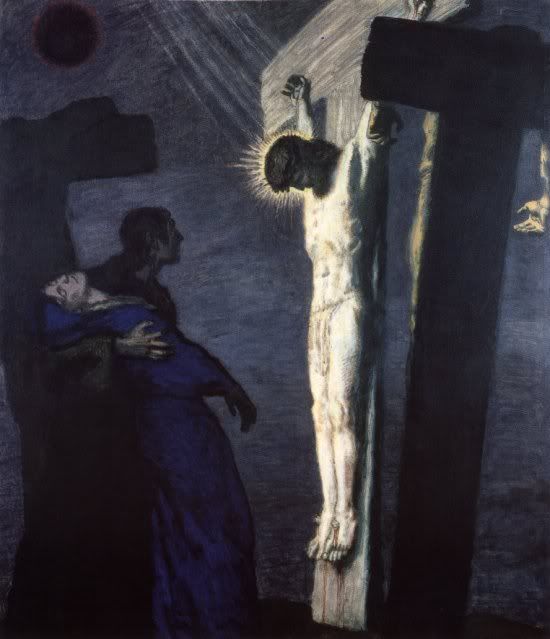As I wrote in my post on Ash Wednesday, I will be meditating on the Seven Last Words of Christ during Lent each Wednesday, ending on Good Friday.
Lent is a time of solemn contemplation of the Passion of Christ. We may choose to meditate, contemplate, or pray on His suffering for us. One way in which me might do this is through devotion to His Seven Last Words—the seven final phrases uttered by Christ as recounted in the Gospels. These Seven Last Words of the Passion of Christ are understood only in light of the true one Word of Life and Resurrection—the phrases uttered by Jesus before His death take on new life and new meaning following the glory of His resurrection. We sit with the pain and loss of crucifixion during Lent, but look forward to the brightness of new life on Easter.
The Seven Last Words
1. “Forgive them, for they know not what they do.” (Luke 23:34) (link)
2. “Today you will be with me in Paradise.” (Luke 23:43) (link)
3. “Woman, Behold your Son. Behold your mother.” (John 19:26-27) (link)
4. “My God, my God, why have you forsaken me” (Mark 15:34) (link)
5. “I thirst.” (John 19:29) (link)
6. “It is finished.” (John 19:30) (link)
7. “Father, into your hands I commend my spirit.” (Luke 23:46)
“Father, into your hands I commend my spirit.” (Luke 23:46)
The first four statements of Jesus on the cross fill us with a sense of the beginning of something, the becoming of the kingdom. We start with the fact that we are forgiven, continue to the experience of happiness, of paradise, even today, and recount the rebirth of the family of God, here on earth—all at the foot of the cross! We are left with a profound sense of hope, in spite of the pain and desolation of the crucifixion, and then reminded of the Lord’s unending longing for us. We are, in His love, perfectly unfinished, awaiting His grace to complete us on the last day.
Jesus has been scourged, crowned with thorns, mocked and humiliated. He has carried an unbearably heavy cross up a steep mountain in the blistering heat. He has had his hands and feet nailed to a cross, and has hung upon it for three hours. He has done all of these things willingly, and without complaint. He has done all of these things for us.
And then he says, “Father, into your hands I commend my spirit."
44It was now about the sixth hour, and darkness came over the whole land until the ninth hour, 45for the sun stopped shining. And the curtain of the temple was torn in two. 46Jesus called out with a loud voice, "Father, into your hands I commit my spirit." When he had said this, he breathed his last. (Luke 23: 44-46)
Jesus died as He lived, in complete obedience to His Father. He died in perfect love and perfect trust in His Father. He died with a prayer on His lips, a prayer for His Father:
5 Into your hands I commit my spirit;
redeem me, O LORD, the God of truth. (Psalm 31:5)
We live in a world where we are taught not to trust people, where our anxiety consumes us despite general assurances of safety and comfort. We are doubtful and disobedient. We like to be in control.
Jesus joyful cry on the cross stands in sharp contrast to our daily lives. He was joyful because His work was done, and He was going home to be with His Father. To rest in Him, as He rests in each one of us. It is in His joy, and at such a cost, that the full measure of Jesus’ trust in His Father’s plan, the full measure of Jesus’ obedience to God’s will becomes perfectly clear. He was going home to rest, as His Father willed it.
We are called to that same rest, eventually in eternity, but in our present lives on earth as well. We are slow to give up our control, to lay down our burdens of anxiety, but that is what the Lord wishes us to do. That is what Father Romanus Cessario declares to be “the only option” for living—the perfect commitment to the will of God. We are reminded of this every time we participate in the Holy Eucharist, when the celebrant raises the transformed body and blood of Jesus Christ high above the alter in an act of surrender. And in the moment, we are called to enact that own surrender in our lives.
Jesus gave his life. The world came to a sudden end. And then, after what must have seemed like an eternity, the world was reborn in the Resurrection. He has already suffered through the worst of what could ever possibly happen to the earth. In return, we must trust that our daily trials and tribulations will be met with the same rebirth, the same Easter, the same Resurrection—granted to us by our heavenly Father.
Trust.
Obedience.
Surrender.
For many of us, more difficult words have never been spoken. We wish to remain in control. We forget the gift that obedience to the Lord is—peace, love, rest in Him (and He in us!). As Saint Teresa of Avila said, “ I know the power obedience has of making things easy which seem impossible.”
The Lord has called us to Himself. He has loved us so gladly that He gave His only Son that we might live. He calls us to live for Him, to love Him, to center ourselves in Him, to rest in Him. On this, the holiest day of our year, we surrender. And in surrendering, we are victorious. We gain the unending love, grace, and peace of God Our Father, Our Lord Jesus Christ, and the Holy Spirit. Suddenly, surrender doesn’t seem so bad.
Prayer of Surrender to the Lord (Saint Ignatius of Loyola)
"Take, O Lord, and receive my entire liberty, my memory, my understanding and my whole will. All that I am and all that I possess You have given me. I surrender it all to You to be disposed of according to Your will. Give me only Your love and Your grace; with these I will be rich enough, and will desire nothing more. Amen.
Day 92 of 365
Prayer Intentions: Trust. Obedience. Surrender.
Requested Intentions: For Healing (A); The blessing of children (S); Safety of travelers (J); Improved family relationship with the Lord, using gifts for His glory (L); For a restorative, faith-deepening Lent for all those who are struggling (L).
Why pray the Rosary every day for a year?
Each time the Blessed Virgin has appeared-- whether it be to Saint Bernadette Soubirous at Lourdes; to Lucia, Jacinta, and Francisco at Fatima; or to Mariette Beco at Banneux-- she has asserted the importance, saving grace, and power of praying the Holy Rosary on a daily basis. Based upon her words, the Rosary is penance and conversion for sinners, a pathway to peace, an end to war, and a powerful act of faith in Jesus Christ. Pope Paul VI presented the Rosary as a powerful means to reach Christ "not merely with Mary but indeed, insofar as this is possible to us, in the same way as Mary, who is certainly the one who thought about Him more than anyone else has ever done."
To show us how this is done, perhaps no one has been more eloquent than the great Cardinal Newman, who wrote: "The great power of the Rosary consists in the fact that it translates the Creed into Prayer. Of course, the Creed is already in a certain sense a prayer and a great act of homage towards God, but the Rosary brings us to meditate again on the great truth of His life and death, and brings this truth close to our hearts. Even Christians, although they know God, usually fear rather than love Him. The strength of the Rosary lies in the particular manner in which it considers these mysteries, since all our thinking about Christ is intertwined with the thought of His Mother, in the relations between Mother and Son; the Holy Family is presented to us, the home in which God lived His infinite love."
As Mary said at Fatima, "Jesus wants to use you to make Me known and loved. He wishes to establish the devotion to My Immaculate Heart throughout the world. I promise salvation to whoever embraces it; these souls will be dear to God, like flowers put by Me to adorn his throne."

Subscribe to:
Post Comments (Atom)













0 comments:
Post a Comment
Thanks for leaving a comment. If you wish to submit a prayer request, however, please do so above, using the "Contact" tab.